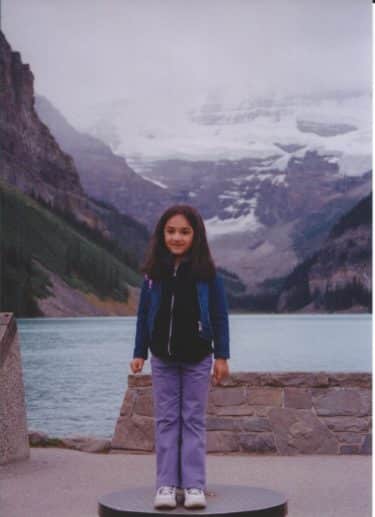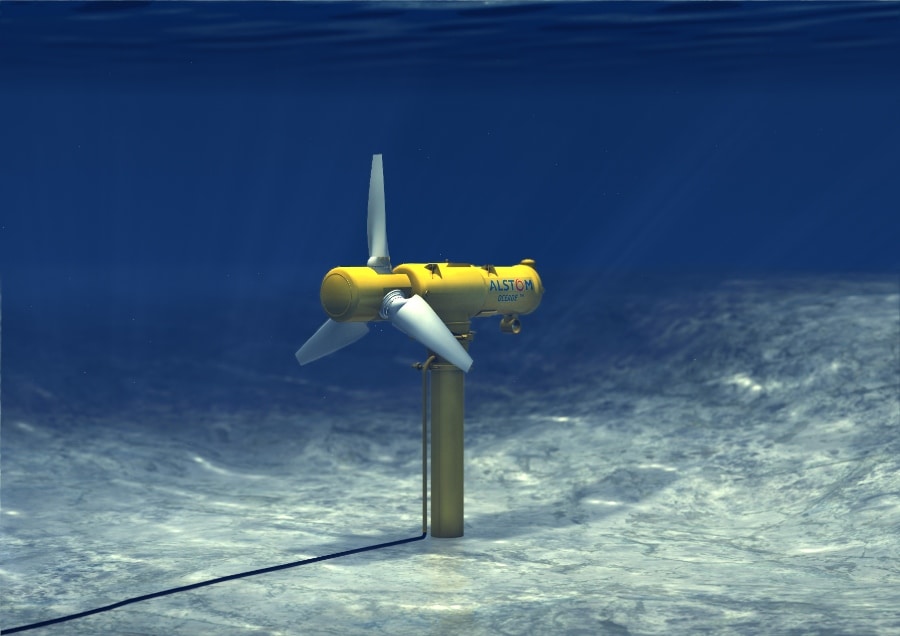Misha Patel
Tidal Engineer
Hello, I’m Misha. I am a PhD student at the University of Oxford, working in the Engineering Science Department on tidal energy! Read on to find out more about me, and check out the video at the bottom of the page which goes into more detail about what I do!
My story
I was born and raised in North-East London and am the youngest sibling in a family of four. Both my parents were born in East Africa (Kenya and Uganda) and moved to the UK as children. My parents work in education and I was lucky to grow up in a house where I was encouraged to pursue anything I wanted.

Me, aged 6, at Jasper National Park in Canada, in front of an ice water lake
As a child, I would always be helping my dad around the house as I loved fixing and building things. At school I particularly enjoyed Maths, but I also liked the more creative subjects and when it came to picking my GCSEs I took a variety of science and humanities subjects, as well as languages. For A-levels I struggled to narrow down what I wanted to do, so I kept my options open and took Maths, Further Maths (this meant I did extra maths modules from the A-level curriculum), Physics and Philosophy. I eventually discovered engineering, which seemed to combine all the things I liked – it was technical, creative, and practical! Engineering uses science and technology to design solutions for society, including engines, machines and structures like bridges.
I moved to Scotland to do my undergraduate degree at the University of Edinburgh in Mechanical Engineering. It was exciting to move to a brand-new city and start university. I had lots of exciting opportunities during my degree – I studied in the USA for 1 year and worked at an engineering consultancy in London for 6 months. I loved studying in Edinburgh and my course introduced me to lots of applications of engineering – medical, robotics, energy, materials and much more! Whilst I was in the USA, I did lots of hands-on engineering and also absorbed all that university life had to offer by attending college football (the American version!) and basketball games. I worked on a sustainable farming project, where I designed equipment to test when and why certain farming machinery fails so it could be improved. When I did my placement in London, I was working on sustainable solutions for sports and music venues internationally. I calculated the energy requirements for iconic buildings while they were being designed and proposed ideas to reduce energy consumption.

Me now, photographed for an interview I did for the Leathersellers’ Company Review, my scholarship provider
Sustainability is all about maintaining resources and ensuring we don’t deplete them for generations to come. Sustainability has always been a theme to the work I did while I was studying engineering and now, I do my research on renewable energy. Renewable energy is energy that comes from natural resources and is renewed. There are many types of renewable energy and I work with tidal energy.
Aside from my research, I am a keen baker and love to make birthday cakes for my family and friends! I am also very passionate about supporting underrepresented groups in engineering and am now a co-lead of the BIPOC STEM Network group at Oxford.
My Research
For my PhD research, I am calculating the amount of energy we can get from sea tides. Tidal energy is a form of renewable energy, which could be incredibly powerful in the fight against climate change. Tides are caused by the gravitational pull of the Moon and Sun on Earth’s sea water and are predictable. The size of tides depends on where the Sun, Earth and Moon are relative to each other. If the Moon is full or new, (which is when the Sun, Moon and Earth are aligned) we get a large tide known as a Spring Tide. When the Sun and Moon are 90° to each other relative to the Earth, we get shorter tides which are called Neap Tides.

Map of the UK showing the tidal stream energy resource sites. The Pentland Firth is outlined in red and is the site I am currently focussing on in my research. (Adapted from: Metoc. Tidal Power in the UK Research Report 1 – UK tidal resource assessment. Technical report, 2007. URL www.metoc.co.uk)
Taking the energy of tides and converting it into electricity is done by placing a turbine in fast moving ocean water. A turbine is a mechanical device with blades that rotate in the fast-moving flow and is essential for converting energy. In the UK we’re lucky to have a lot of access to this – being an island! I am looking at a major site off the north coast of Scotland where there is an energetic stream of water between the mainland and the Orkney islands, which is perfect for studying/generating/understanding tidal energy!
There are a number of things to consider when harnessing this energy. For example, how does this type of energy extraction affect the sea life or the navigation of ships in each area? Many researchers are working on different aspects of this problem to ensure we can harness energy and have minimal impact on the environment.
For my research I create computer models, which simulate the motion of tides and calculate the power output of tidal turbines. The models I create are supported by a combination of maths, physics, and geography. For the geography aspect, I need to create the outline of land for the area I am modelling using maps and identify what the seabed is made up of. Tides are affected by the position of the Sun and Moon and there are many interactions between the turbine and the ocean, which introduces physics and maths to the problem.

One example of tidal turbine, although there are many designs; photo credit to Alstom
Day to day, I spend a lot of time doing computer programming, analysing results, planning next steps for my research, and reading relevant articles and papers. Doing a PhD requires problem solving and creativity – most of the time things won’t work out as you planned, so you have to come up with solutions and new ways of doing things!


